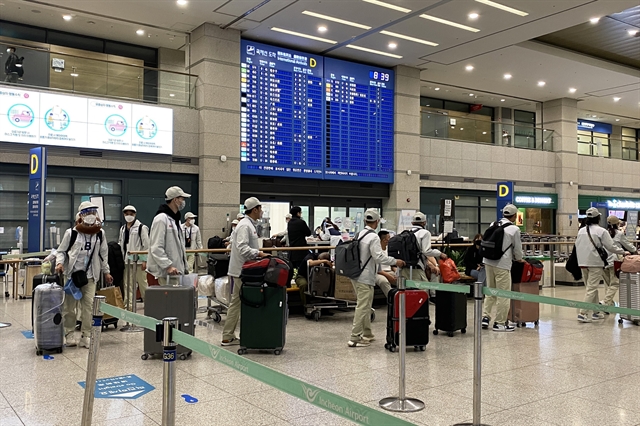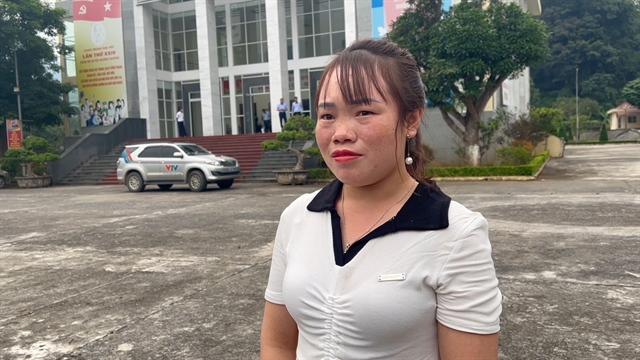 Society
Society

 |
| Vietnamese labourers complete check-in procedures at Incheon International Airport in South Korea. — VNA/VNS Photo |
HÀ NỘI — Việt Nam has strengthened policies to support ethnic minorities to work abroad, considering it one of the breakthrough solutions in poverty reduction for ethnic minority people in disadvantaged areas.
Those who go overseas for work can earn high incomes, so they can quickly get out of poverty, and learn skills to set up their own businesses when returning home.
Deputy Director of the Ministry of Labour, Invalids and Social Affairs’ Department of Overseas Labour Nguyễn Gia Liêm said the national programme on socio-economic development in ethnic minority areas, which is being implemented between 2021 and 2025, aims to improve the lives and livelihoods of ethnic minority groups in Việt Nam.
As part of the programme, ethnic minorities of working age will receive support suitable to their aspirations and living conditions.
This year, a series of policies have been issued to support ethnic youths of working age to work abroad.
Under the ministry’s Circular 17, ethnic minorities of working age are eligible for vocational training, foreign language skills, and assistance during the procedures of going abroad to work.
Under the Ministry of Finance’s Circular 15, an ethnic minority can be given up to VNĐ4 million (US$169) for foreign language training. He/she can also receive support of VNĐ50,000 ($2) for meals per day, VNĐ400,000 ($16) for accommodation per month, and additional expenses of VNĐ600,000 ($24).
Ethnic minorities are also offered travel expenses of VNĐ200,000 ($8) or VNĐ300,000 ($12) depending on the distance during the training time.
In addition, VNĐ750,000 ($30) for a medical examination before going to work abroad will be covered.
They are also entitled to preferential loans from the Bank for Social Policies.
Liêm said supportive policies have been implemented at every step of sending ethnic minority people to work abroad, helping them feel secure and confident when deciding to work abroad.
Working overseas, a door to poverty reduction
Working abroad has become a financial lifeline for Triệu Phụ Thanh, making him one of the people with the highest income in his commune in northern mountainous Lào Cai Province.
Thanh was among the first in La Pán Tẩn Commune in Mường Khương District to leave farm work behind and work abroad in South Korea.
Being naturally agile, eager to learn, and fluent in a foreign language, Thanh could earn up to nearly VNĐ70 million ($2,971) in peak months in South Korea.
After nearly five years working there, Thanh returned home and invested in planting six hectares of cinnamon. His cinnamon garden is seven years old this year with estimated value of more than VNĐ3 billion ($127,360).
Thanh said his family would probably have been a poor if he had insisted on working on the small farm he was given when getting married.
“Life is much better now. Thanks to the working in South Korea, I could earn money and learn and apply science and technology in animal husbandry and farming to start my own business,” he said.
 |
| Ma Sèo Mào, a 27-year-old Mông woman in Lũng Vai Commune in Mường Khương District in northern Lào Cai Province, is preparing to work in South Korea. — VNA/VNS Photo |
Ma Sèo Mào, a 27-year-old Mông woman from Lũng Vai Commune in Mường Khương District, is another case of getting out of poverty and creating wealth.
“My husband has been working in South Korea for four years. His salary is about VNĐ30 million ($1,273). We spent his earnings to buy land to grow acacia and bananas,” she said.
Mào has also planted more than 30,000 cinnamon trees in her garden. She hires 20-30 local people to help tend the trees, and a person to be in charge of the garden.
She is now preparing to go to South Korea to work with her husband. She has passed the South Korean language examination, her first challenge.
“My husband encourages me to go abroad as we can earn high incomes and learn a lot of useful knowledge. We plan to work abroad for a few more years and earn a little more capital to expand our production at home,” she shared.
Nguyễn Thị Hồng Minh, deputy director of the provincial Department of Labour, Invalids and Social Affairs, said that the province is home to a large number of ethnic minorities, so helping labourers to work abroad is a top priority. — VNS